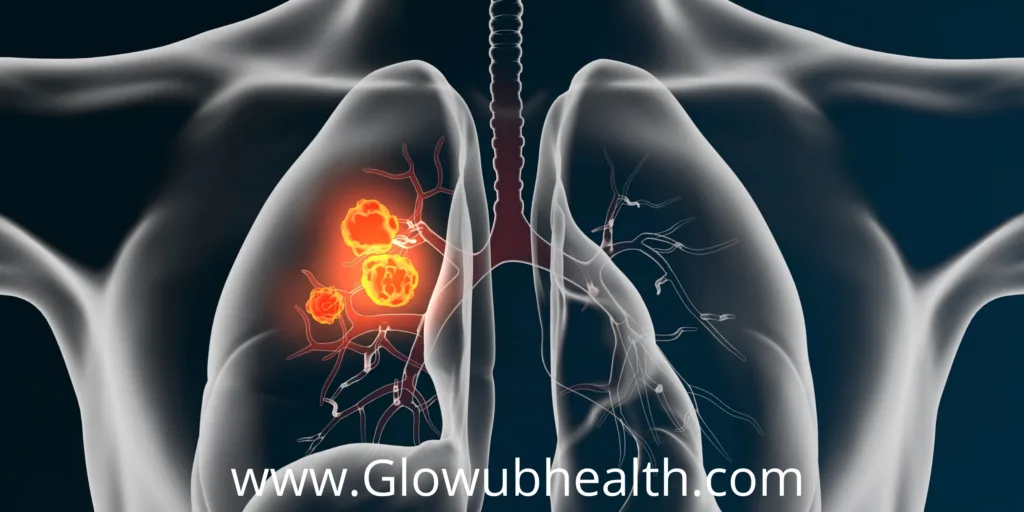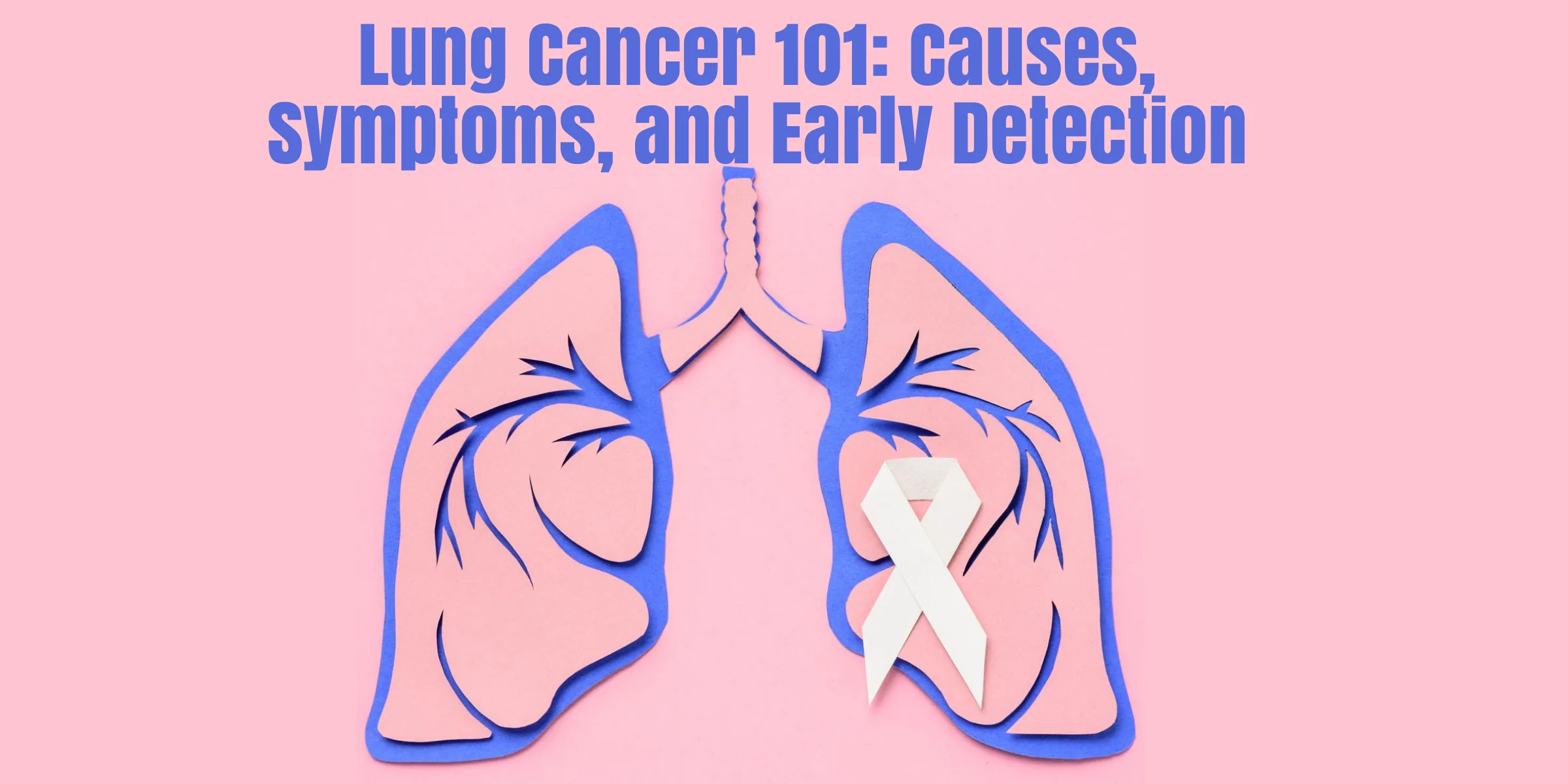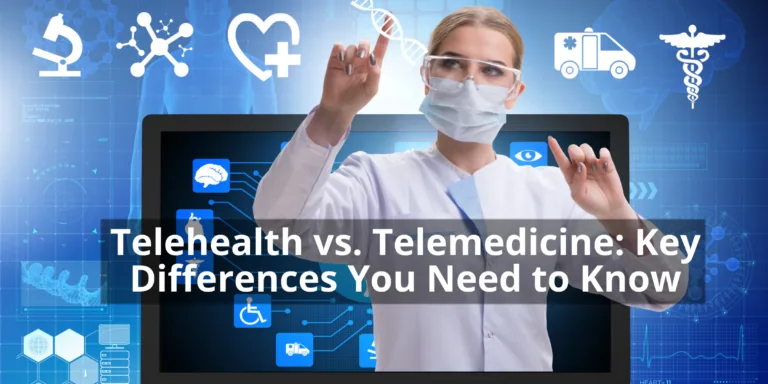Lung Cancer 101: Causes, Symptoms, and Early Detection
Lung cancer remains one of the most serious health challenges of our time—it’s the leading cause of cancer-related deaths globally. But behind the statistics are real people, families, and stories. The good news? Awareness and early action can make a powerful difference.
In this guide, we’ll break down everything you need to know about lung cancer—its causes, the subtle symptoms that often go unnoticed, and why early detection is so critical. Whether you’re looking out for your own health or supporting someone you love, this article offers practical, compassionate, and research-backed insights to help you stay informed and proactive.
This article is for informational purposes only and is not a substitute for professional medical advice, diagnosis, or treatment. If you are experiencing symptoms or have concerns about lung cancer, please consult a qualified healthcare professional immediately.
What Is Lung Cancer?

Lung cancer begins when abnormal cells grow uncontrollably in the lungs, forming tumors. These tumors can interfere with the lungs’ ability to provide oxygen to the body. There are two main types:
- Small Cell Lung Cancer (SCLC): Accounts for about 10-15% of lung cancers. It grows quickly and is often linked to smoking.
- Non-Small Cell Lung Cancer (NSCLC): The most common type, making up about 85% of cases, with subtypes like adenocarcinoma, squamous cell carcinoma, and large cell carcinoma.
Understanding the type is crucial for determining the most effective lung cancer treatment options.
Causes of Lung Cancer
1) Smoking
Smoking is the leading cause, responsible for about 85% of lung cancer cases. The carcinogens in tobacco damage lung tissue, leading to mutations that trigger cancer.
2) Secondhand Smoke
Even non-smokers can develop lung cancer through prolonged exposure to secondhand smoke.
3) Air Pollution and Environmental Factors
Exposure to pollutants, radon gas, and asbestos increases risk. Radon is a radioactive gas found in homes and workplaces that contributes significantly to lung cancer in non-smokers.
4) Genetic Predisposition
Some individuals may have a genetic predisposition, making them more susceptible despite not smoking or being exposed to environmental risks.
5) Medical Conditions
Chronic lung diseases like COPD or a history of other cancers may elevate risk.
Recognizing Lung Cancer Symptoms
Early detection is crucial for improving the lung cancer survival rate, which remains low if the cancer is caught in advanced stages. Common lung cancer symptoms include:
- Persistent cough that doesn’t go away
- Chest pain that worsens with deep breathing or coughing
- Shortness of breath
- Hoarseness
- Unexplained weight loss
- Fatigue
- Frequent lung infections (like bronchitis or pneumonia)
- Coughing up blood (hemoptysis)
When to See a Doctor
If these symptoms persist for more than two weeks, especially in smokers or those with a family history, immediate medical attention is necessary.
The Importance of Early Detection

Early-stage lung cancer is often asymptomatic, making regular screening vital. Detection in stages I or II dramatically increases the lung cancer survival rate compared to later stages.
Screening Methods
- Low-Dose CT (LDCT) Scans
LDCT is the most effective screening method, capable of detecting small nodules or abnormalities in the lungs.
- Biomarker Testing
Helps determine the molecular characteristics of the cancer, aiding in targeted therapies like Tagrisso, a drug used to treat specific mutations in lung cancer.
- X-rays and MRI Scans
These may be used but are less sensitive compared to LDCT.
Lung Cancer Treatment Options
Advancements in treatments have improved outcomes for many patients. Treatment varies based on the type and stage of the cancer.
1) Surgery
For early-stage lung cancer, surgery may remove part of the lung (lobectomy) or the entire lung (pneumonectomy).
2) Radiation Therapy
Uses high-energy rays to target and kill cancer cells. Often combined with other treatments for better results.
3) Chemotherapy
A systemic treatment that kills rapidly dividing cells, including cancerous ones. It is often used for small cell lung cancer or advanced cases.
4) Targeted Therapy
Drugs like Tagrisso target specific genetic mutations, providing a personalized approach to treatment.
5) Immunotherapy
Helps the immune system recognize and fight cancer cells. Drugs like checkpoint inhibitors have shown promise.
Read More: Respiratory Infections: Top 10 Ways to Boost Your Immune System Against Illness
Practical Tips for Reducing Risk
While not all lung cancer cases are preventable, certain lifestyle changes can significantly lower your risk:
- Quit Smoking: Seek support groups or medications to help.
- Avoid Secondhand Smoke: Advocate for smoke-free environments.
- Test for Radon: Use radon detectors in homes and workplaces.
- Maintain a Healthy Diet: A balanced diet rich in antioxidants supports lung health.
- Exercise Regularly: Improves lung capacity and overall health.
The Emotional and Mental Health Impact
Lung cancer doesn’t just affect the body; it can take a toll on mental health. Anxiety, depression, and fear are common among patients and their families.
Coping Strategies
- Support Groups: Sharing experiences with others facing lung cancer can provide relief and encouragement.
- Therapy: Counseling can help patients and caregivers navigate emotional challenges.
- Mindfulness Practices: Techniques like meditation can reduce stress.
Mini Case Study: A Survivor’s Story
Maria’s Journey with Stage III Lung Cancer
Maria, a 58-year-old non-smoker, was diagnosed with stage III lung cancer. Her symptoms included persistent fatigue and mild chest pain.
A low-dose CT scan confirmed the diagnosis. She underwent a combination of surgery, targeted therapy using Tagrisso, and immunotherapy.
Today, Maria is cancer-free and actively raises awareness about the importance of early detection.
Conclusion: Take Charge of Your Lung Health
Lung cancer is a formidable challenge, but awareness, early detection, and advances in treatment are paving the way for better outcomes.
If you or a loved one are experiencing lung cancer symptoms, don’t hesitate to seek medical attention. Together, we can increase the lung cancer survival rate and bring hope to millions.
For more detailed information on lung cancer and treatment options, consult with your healthcare provider or visit reputable resources like the American Cancer Society or Lung Cancer Research Foundation.
FAQ
1. What is lung cancer, and what causes it?
Lung cancer occurs when abnormal cells in the lungs grow uncontrollably, forming tumors. Common causes include smoking, secondhand smoke, exposure to radon gas, air pollution, and genetic predisposition.
2. What are the most common symptoms of lung cancer?
Symptoms may include:
-Persistent cough
-Chest pain
-Shortness of breath
-Unexplained weight loss
-Fatigue
-Coughing up blood
3. Can non-smokers get lung cancer?
Yes, non-smokers can develop lung cancer due to factors like secondhand smoke, radon exposure, air pollution, or genetic predisposition. About 10-15% of lung cancer cases occur in non-smokers.
4. How is lung cancer diagnosed?
Doctors use imaging tests like chest X-rays, CT scans, and MRI scans to detect abnormalities. Biopsies and biomarker testing can confirm and identify the type of lung cancer.
5. Is lung cancer curable?
The chances of a cure depend on the cancer type, stage, and treatment. Early detection significantly improves the prognosis, with treatments like surgery, radiation, chemotherapy, targeted therapy (e.g., Tagrisso), and immunotherapy offering promising outcomes.
6. What are the survival rates for lung cancer?
The lung cancer survival rate varies depending on the type and stage. Early-stage non-small cell lung cancer (NSCLC) has higher survival rates, while late-stage cancers typically have lower rates. Advances in treatment are improving these statistics.
7. What is the role of sugar in cancer development?
Cancer cells consume glucose (sugar) for energy, but all cells in the body need glucose. While excessive sugar intake can contribute to obesity and inflammation, which are cancer risk factors, cutting sugar entirely is not a cure for cancer.
8. Can diet help prevent or treat lung cancer?
A balanced diet rich in fruits, vegetables, lean proteins, and whole grains supports overall health and may complement cancer treatments. Limiting added sugars and avoiding processed foods can help reduce cancer risk factors like obesity.
9. Are there new treatments for lung cancer?
Yes, advancements in targeted therapies (e.g., Tagrisso) and immunotherapy have provided effective treatment options for specific types of lung cancer. These treatments are tailored to genetic mutations and help improve outcomes.






